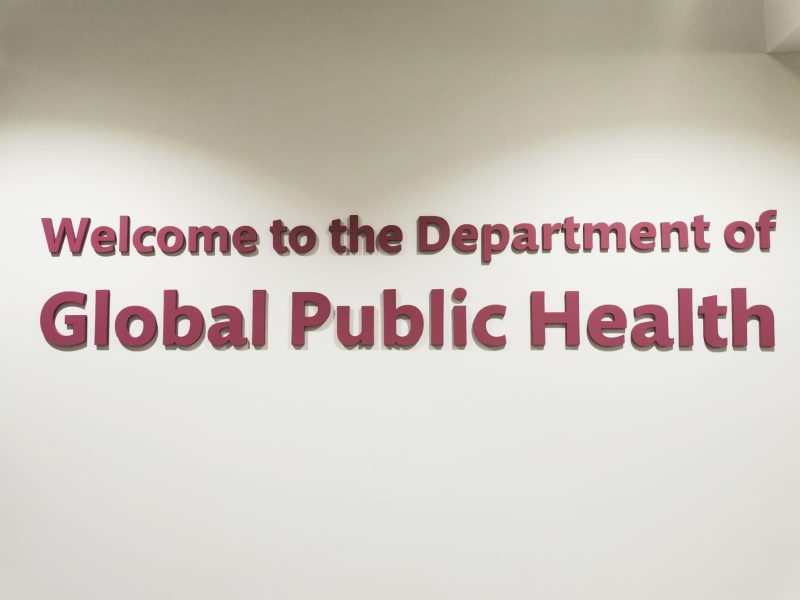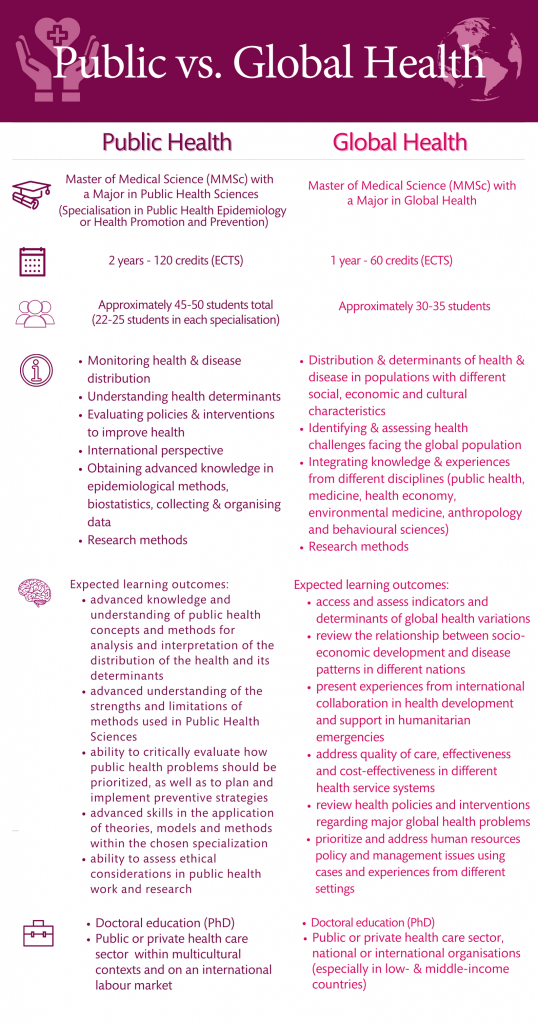
“Public vs. Global Health”: a Public Health student’s perspective.
Are you interested in studying public health or global health but you are not sure which of KI’s master’s programmes is right for you? Then, hopefully, this two-part blog series will help you with your decision!
Alexandra from the global health master’s and I decided to investigate the differences and similarities of our programmes. (Be sure to read Alexandra’s blog to hear from a global health student’s perspective.)
As you read this blog, please keep in mind that this blog is written from the perspective and based on the experiences of students who started their master’s in 2021. Make sure to thoroughly check the programme websites to get the most accurate and detailed information about the programmes.
The Programmes
The Master’s Programme in Public Health Sciences and the Master’s Programme in Global Health provide excellent preparation for a career in helping support the health of population groups in various contexts. But depending on your background and career interests, one programme may be more suitable than the other.
To provide a quick overview of some key differences between the two programmes, we created the table below.

Interviewing Public Health Students
Understanding each programmes’ structure and content is a helpful first step in deciding which programme to apply to (or if you choose to apply to both, which programme to rank first). But hearing the personal insight of students can provide a more nuanced perspective. So Alexandra and I interviewed students who applied to both programmes last year.
Read on to hear how Simone and Blanca from the Master’s Programme in Public Health Sciences navigated this decision.
Why did you apply to both programs?
Simone: “I felt like they would both get me to where I want to be in the future. I was actually more interested in the Global Health programme because I want to work on health problems of global significance, especially those rooted in the Global South. I thought that Public Health programmes would be more focused on a national level and I wasn’t too interested on learning so much about the Swedish healthcare system when I’m hoping to work in South Africa where the health architecture is dramatically different. I applied to the Global Health programme at KI as my first choice, but made the Public Health programme my second choice.”
Blanca: “Firstly, I had a big dilemma when it comes to whether I wanted to get more focused on one discipline or another. However, I got to the conclusion that both fields are quite similar regarding the job that you can end up working in. In my case, I decided to go for Public Health because I thought this program would give me more ‘hard skills’ about how the populational level works and how to perform good research in this area.”
What were your expectations of each programme?
Simone: “I expected the Global Health programme to be very intense as it is only one year. For Public Health, I had heard it was more research skills focused, so I expected more courses about developing good research practices.”
Blanca: “When it comes to the Public Health program, I expected more specific knowledge about the scientific foundation of populational health. I had the feeling I would learn better how disease distribution works, and which are the conditions needed for disease to spread in the communicable diseases’ context but also in the NDCs one. Regarding the Global Health program, I had the feeling it was more about assessing the different health issues affecting the world now but without taking into consideration the ‘hard skills’ arena. Moreover, the Global Health program is a one-year master which means that you have less time to learn per se.”
How do you expect that the master’s degree will support your future career goals?
Simone: “I think the Public Health programme will give me the practical research skills I need to complete significant research in my future career. My main interest in the field is sexual and reproductive health, which is mainly combatted with promoting and preventing techniques. I hope to learn more skills in this area by being in the Health Promotion and Prevention track which I can apply in my future work in this field and still make a difference in the health areas I’m interested in. Additionally, both programmes offer opportunities to grow in teamwork and people skills. “
Blanca: “I hope this program helps me to have a meaningful foundation on Public Health in order to be able to apply it in the branch or public health topic I would like to get specialized in. In the end, no matter the track you choose, Global Public Health is a very general discipline and all the tools you can learn and gather throughout your professional career will be useful in one way or another.”
Which criteria influenced your final decision?
Simone: “I emailed a former digital ambassador to ask for their advice on Global Health vs. Public Health and they said that Global Health is more theoretical and ideological, while Public Health is more focused on building skills for research. At the end of the email, they said I needed to think about whether I wanted Global Health knowledge, or Public Health skills. This really stuck with me and helped me make the decision to study Public Health at KI. In the end, I was waitlisted for Global Health and offered a place for Public Health. Even though I probably would have found a Global Health programme more interesting content-wise, I really need to learn the foundational skills for a future in research.”
Blanca: “I had the feeling Public Health Sciences would give me the strongest background to be able to assess public health issues from a scientific perspective. Moreover, I have always thought Epidemiology is a field that would be harder to learn if you don’t take ‘formal education’ on the topic. Finally, I have also worked in different NGOs in the Global Health arena, and I had the feeling that this time I needed to cover the scientific-based skills to study Global Public Health issues rather than learning those topics themselves.”
Are you happy with your choice after all?
Simone: “While this outcome wasn’t my first choice, I am happy that it is where I have ended up. I think both programmes would support me in pursuing a future career in meaningful health research. The Public Health programme will provide me with more of the practical skills that I need to actually do the work in my future, even though I don’t find all the courses very interesting. There is also so much more to the opportunity of studying at KI than the programme you choose. I have gained so much from being a part of student societies, sports and other extracurricular activities.”
Blanca: “I believe I will learn a lot in the program I chose and that it will be an important experience in my professional journey. So far, I am really happy with my choice and it’s been a valuable learning process. I believe I would have also learned a lot in the Global Health program. Nonetheless, all the courses I have had until now are fulfilling the expectations I had when it comes to learning the scientific foundation of populational health.”
We hope you found this blog series helpful!
Make sure to check the programme websites for detailed information on the programmes and universityadmissions.se to learn more about the application and admissions process.
If you have any further questions, please don’t hesitate to contact us. Good luck with your applications!
Sarah and Alexandra 🙂
sarah.pechtl@stud.ki.se
Sarah Pechtl – Public Health Sciences, Health Promotion and Prevention
Hej! My name is Sarah and I’m excited to share my experiences as a Public Health Sciences, Health Promotion and Prevention student with you! I grew up in Salzburg, Austria but completed my bachelor’s degree in the United States where I studied nutrition and sociology. When I learned about KI‘s emphasis on collaboration and the diverse student cohort, I knew that KI is where I wanted to pursue my master’s degree. In my free time, I love having “fika” with my peers, spending time outdoors, exploring Stockholm and––on colder days––knitting.

0 comments